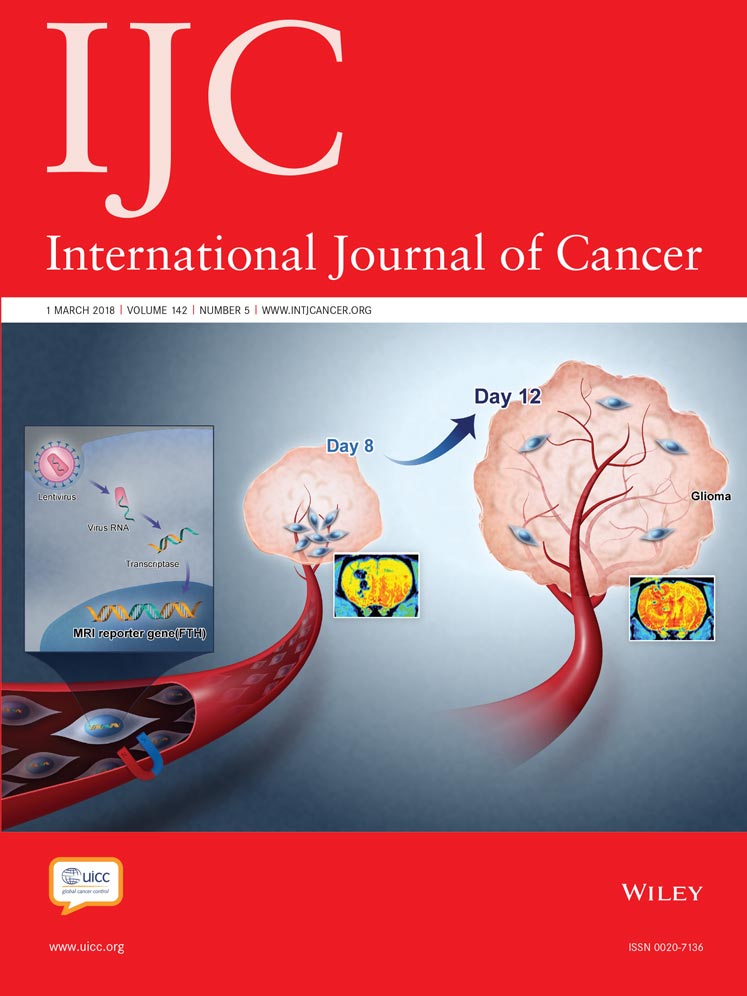Relevance of liver-limited disease in metastatic colorectal cancer: Subgroup findings of the FIRE-3/AIO KRK0306 trial
Conflict of Interest: J.W.H. has served on advisory boards for Roche, has received honoraria from Roche and travel support from Novartis. S.S. has received honoraria for talks, served on advisory boards, and received travel support from Amgen, Bayer, Lilly, Sanofi, Roche, Merck KgaA, and Takeda. A.K. has received honoraria and travel support from Merck, Roche and Amgen. S.-E.A.-B. has received honoraria from Roche, Celgene, Lilly, Nordic Pharma, has served on advisory boards for Merck, Roche, Celgene, Lilly, BMS, Servier and has received research grants from Sanofi, Roche, Celgene, Vifor, Medac, Hospira, Lilly, Novartis, German Research Association, German Cancer Aid, Federal ministry of Education and Research, Merrimack. F.K. has received honoraria (speakers engagements) from Roche. H.L. has received honoraria from Amgen, Teva, Vifor Pharma, Pfizer, Takeda, Novartis and has served on advisory boards for Amgen, Novartis, Teva, MSD Oncology, Celgene, Vifor Pharma, Lilly, Mundipharma. M.M. has received honoraria from Falk, Nordic, Amgen, mci, Lilly, MSD, Merck, Pfizer, BMS, ESMO, ASCO and travel support from Merck KgaA, Amgen, Roche. He served on advisory boards for Lilly, Onyx, Roche, BMS, MSD, Amgen, Merck, Pfizer. R.U.L. has served on advisory boards for BAXALTA and has received travel support from Celgene, GILED and Amgen. T.K. has received honoraria from Merck KGaA, AstraZeneca and has served on advisory boards for Amgen, AstraZeneca, Merck KGaA, MSD, Novartis, Pfizer and Roche. A.J. received honoraria and travel support from speaker's bureaus of Amgen, AstraZeneca, Merck-Serono, and Roche served as an advisor in boards for Amgen, AstraZeneca, Biocartis, Merck-Serono. D.P.M. has received honoraria and advisory boards: Amgen, Merck, Roche, BMS, MSD, Servier, Pfizer, Sirtex. Travel support: Merck, Roche, BMS, Bayer, Amgen. V.H. has received honoraria from Merck KgaA, Roche AG, Amgen, Sanofi, SIRTEX, Baxalta and has received travel support from Merck KgaA, Roche AG, Amgen, SIRTEX, Baxalta and has served on advisory boards for Merck KgaA, Roche AG, Amgen, Sanofi, Lilly, SIRTEX, Böhringer Ingelheim, Baxalta, Taiho, Merrimack.
Abstract
In metastatic colorectal cancer (mCRC), liver-limited disease (LLD) is associated with a higher chance of metastectomy leading to long-term survival. However, limited data describes the prognostic and predictive relevance of initially unresectable LLD with regard to targeted first-line therapy. The present analysis investigated the relevance of initially unresectable LLD in mCRC patients treated with targeted therapy against either the epidermal growth factor receptor (EGFR) or vascular epithelial growth factor (VEGF). The analysis was performed based on FIRE-3, a randomized phase III trial comparing first-line chemotherapy with FOLFIRI plus either cetuximab (anti-EGFR) or bevacizumab (anti-VEGF) in RAS wild-type (WT) mCRC. Of 400 patients, 133 (33.3%) had LLD and 267 (66.8%) had non-LLD. Median overall survival (OS) was significantly longer in LLD compared to non-LLD patients (36.0 vs. 25.4 months; hazard ratio [HR] = 0.66; 95% confidence interval [CI]: 0.51–0.87; p = 0.002). In a multivariate analysis also including secondary hepatic resection as time-dependent variable, LLD status was independently prognostic for OS (HR = 0.67; 95% CI: 0.50–0.91; p = 0.01). As assessed by interaction tests, treatment benefit from FOLFIRI plus cetuximab compared to FOLFIRI plus bevacizumab was independent of LLD status with regard to objective response rate (ORR), early tumour shrinkage ≥20% (ETS), depth of response (DpR) and OS (all p > 0.05). In conclusion, LLD could be identified as a prognostic factor in RAS-WT mCRC, which was independent of hepatic resection in patients treated with targeted therapy. LLD had no predictive relevance since benefit from FOLFIRI plus cetuximab over bevacizumab was independent of LLD status.
Abstract
What's new?
Metastatic colorectal cancer (mCRC) patients with liver-limited disease (LLD) have been described as optimal candidates for metastectomy leading to long-term survival. However, few studies have evaluated the prognostic and predictive relevance of initially unresectable LLD treated with targeted first-line therapy. Here, LLD was examined in RAS wild-type mCRC patients enrolled in FIRE-3, a trial comparing first-line FOLFIRI plus either cetuximab (anti-EGFR) or bevacizumab (anti-VEGF). LLD constituted a prognostic factor, which was independent of secondary metastectomy. Furthermore, treatment response and survival were more favourable when using FOLFIRI plus cetuximab compared to bevacizumab, irrespective of LLD status.




